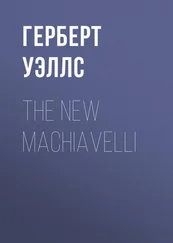H. Wells - THE NEW MACHIAVELLI
Здесь есть возможность читать онлайн «H. Wells - THE NEW MACHIAVELLI» весь текст электронной книги совершенно бесплатно (целиком полную версию без сокращений). В некоторых случаях можно слушать аудио, скачать через торрент в формате fb2 и присутствует краткое содержание. Жанр: Классическая проза, на английском языке. Описание произведения, (предисловие) а так же отзывы посетителей доступны на портале библиотеки ЛибКат.
- Название:THE NEW MACHIAVELLI
- Автор:
- Жанр:
- Год:неизвестен
- ISBN:нет данных
- Рейтинг книги:5 / 5. Голосов: 1
-
Избранное:Добавить в избранное
- Отзывы:
-
Ваша оценка:
- 100
- 1
- 2
- 3
- 4
- 5
THE NEW MACHIAVELLI: краткое содержание, описание и аннотация
Предлагаем к чтению аннотацию, описание, краткое содержание или предисловие (зависит от того, что написал сам автор книги «THE NEW MACHIAVELLI»). Если вы не нашли необходимую информацию о книге — напишите в комментариях, мы постараемся отыскать её.
THE NEW MACHIAVELLI — читать онлайн бесплатно полную книгу (весь текст) целиком
Ниже представлен текст книги, разбитый по страницам. Система сохранения места последней прочитанной страницы, позволяет с удобством читать онлайн бесплатно книгу «THE NEW MACHIAVELLI», без необходимости каждый раз заново искать на чём Вы остановились. Поставьте закладку, и сможете в любой момент перейти на страницу, на которой закончили чтение.
Интервал:
Закладка:
and in them fishes lurked-to me they were big fishes-water-boatmen
and water-beetles traversed the calm surface of these still deeps;
in one pool were yellow lilies and water-soldiers, and in the shoaly
places hovering fleets of small fry basked in the sunshine-to
vanish in a flash at one's shadow. In one place, too, were Rapids,
where the stream wokewith a start from a dreamless brooding into
foaming panic and babbled and hastened. Well do I rememberthat
half-mile of rivulet; all other rivers and cascades have their
reference to it for me. And after I was eleven, and before we left
Bromstead, all the delight and beauty of it was destroyed.
The volume of its water decreased abruptly-I suppose the new
drainage works that linked us up with Beckington, and made me first
acquainted with the geological quality of the London clay, had to do
with that-until only a weak uncleansing trickle remained. That at
first did not strike me as a misfortune. An adventurous small boy
might walk dryshod in places hitherto inaccessible. But hard upon
that came the pegs, the planks and carts and devastation. Roper's
meadows, beingno longer in fearof floods, were now to be slashed
out into parallelograms of untidy road, and built upon with rows of
working-class cottages. The roads came,-horribly; the houses
followed. They seemed to rise in the night. People moved into them
as soon as the roofs were on, mostly workmen and their young wives,
and already in a year some of these raw houses stood empty again
from defaulting tenants, with windows broken and wood-work warping
and rotting. The Ravensbrook became a dump for old iron, rusty
cans, abandoned boots and the like, and was a river only when
unusual rains filled it for a day or so with an inky flood of
surface water…
That indeed was my most striking perceptionin the growthof
Bromstead. The Ravensbrook had been important to my imaginative
life; that way had always been my first choice in all my walks with
my mother, and its rapid swamping by the new urban growthmade it
indicative of all the other things that had happened just before my
time, or were still, at a less dramatic pace, happening. I realised
that building was the enemy. I began to understandwhy in every
direction out of Bromstead one walked past scaffold-poles into
litter, why fragments of broken brick and cinder mingled in every
path, and the significance of the universal notice-boards, either
white and new or a year old and torn and battered, promising sites,
proffering houses to be sold or let, abusing and intimidating
passers-by for fancied trespass, and protecting rights of way.
It is difficult to disentangle now what I understoodat this time
and what I have since come to understand, but it seems to me that
even in those childish days I was acutely aware of an invading and
growingdisorder. The serene rhythms of the old established
agriculture, I seenow, were everywhere beingreplaced by
cultivation under notice and snatch crops; hedges ceasedto be
repaired, and were replaced by cheap iron railings or chunks of
corrugated iron; more and more hoardings sprang up, and contributed
more and more to the nomad tribes of filthy paper scraps that flew
before the wind and overspread the country. The outskirts of
Bromstead were a maze of exploitation roads that led nowhere, that
ended in tarred fences studded with nails (I don't rememberbarbed
wire in those days; I thinkthe Zeitgeist did not produce that until
later), and in trespass boards that used vehement language. Broken
glass, tin cans, and ashes and paper abounded. Cheap glass, cheap
tin, abundant fuel, and a free untaxed Press had rushed upon a world
quite unprepared to disposeof these blessings when the fulness of
enjoymentwas past.
I suppose one might have persuaded oneself that all this was but the
replacement of an ancient tranquillity, or at least an ancient
balance, by a new order. Only to my eyes, quickened by my father's
intimations, it was manifestly no order at all. It was a multitude
of incoordinated fresh starts, each more sweeping and destructive
than the last, and none of them ever reallyworked out to a ripe and
satisfactorycompletion. Each left a legacy of products, houses,
humanity, or what not, in its wake. It was a sort of progress that
had bolted; it was change out of hand, and going at an unprecedented
pace nowhere in particular.
No, the Victorian epoch was not the dawn of a new era; it was a
hasty, trial experiment, a gigantic experiment of the most slovenly
and wasteful kind. I suppose it was necessary; I suppose all things
are necessary. I suppose that before men will discipline themselves
to learn and plan, they must first seein a hundred convincing forms
the folly and muddle that come from headlong, aimless and haphazard
methods. The nineteenth century was an age of demonstrations, some
of them very impressive demonstrations, of the powers that have come
to mankind, but of permanent achievement, what will our descendants
cherish? It is hard to estimate what grains of precious metal may
not be found in a mud torrent of human production on so large a
scale, but will any one, a hundred years from now, consent to live
in the houses the Victorians built, travel by their roads or
railways, value the furnishings they made to live among or esteem,
except for curious or historical reasons, their prevalent art and
the clipped and limitedliterature that satisfiedtheir souls?
That age which bore me was indeed a world full of restricted and
undisciplined people, overtaken by power, by possessions and great
new freedoms, and unable to make any civilised use of them whatever;
stricken now by this idea and now by that, tempted first by one
possession and then another to ill-considered attempts; it was my
father's exploitahon of his villa gardens on the wholesale level.
The whole of Bromstead as I rememberit, and as I sawit last-it is
a year ago now-is a dull useless boiling-up of human activities, an
immense clustering of futilities. It is as unfinished as ever; the
builders' roads still run out and end in mid-field in their old
fashion; the various enterprises jumble in the same hopeless
contradiction, if anything intensified. Pretentious villas jostle
slums, and public-house and tin tabernacle glower at one another
across the cat-haunted lot that intervenes. Roper's meadows are now
quite frankly a slum; back doors and sculleries gape towards the
railway, their yards are hung with tattered washing unashamed; and
there seem to be more boards by the railway every time I pass,
advertising pills and pickles, tonics and condiments, and suchlike
solicitudes of a people with no natural health nor appetite left in
them…
Well, we have to do better. Failure is not failure nor waste wasted
if it sweeps away illusion and lights the road to a plan.
6
Chaotic indiscipline, ill-adjusted effort, spasmodic aims, these
give the quality of all my Bromstead memories. The crowning one of
them all rises to desolating tragedy. I remembernow the wan spring
sunshine of that Sunday morning, the stiff feelingof best clothes
and aggressive cleanliness and formality, when I and my mother
returned from church to find my father dead. He had been pruning
the grape vine. He had never had a ladder long enough to reach the
sill of the third-floor windows-at house-painting times he had
Читать дальшеИнтервал:
Закладка:
Похожие книги на «THE NEW MACHIAVELLI»
Представляем Вашему вниманию похожие книги на «THE NEW MACHIAVELLI» списком для выбора. Мы отобрали схожую по названию и смыслу литературу в надежде предоставить читателям больше вариантов отыскать новые, интересные, ещё непрочитанные произведения.
Обсуждение, отзывы о книге «THE NEW MACHIAVELLI» и просто собственные мнения читателей. Оставьте ваши комментарии, напишите, что Вы думаете о произведении, его смысле или главных героях. Укажите что конкретно понравилось, а что нет, и почему Вы так считаете.










